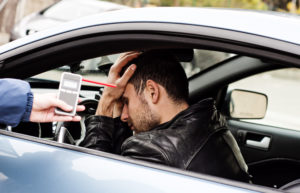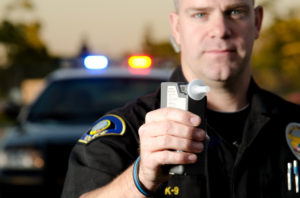Georgia’s Intoxilyzer 9000 Breath Test
Our Attorneys Help Clients Fight DUI and Refusal Charges
 The blood alcohol content (BAC) readings given by Georgia’s Intoxilyzer 9000 breath testing device are normally the most important type of evidence in most DUI cases. If you are facing charges of DUI or breath test refusal, you need a lawyer who understands how this machine works and how to attack it.
The blood alcohol content (BAC) readings given by Georgia’s Intoxilyzer 9000 breath testing device are normally the most important type of evidence in most DUI cases. If you are facing charges of DUI or breath test refusal, you need a lawyer who understands how this machine works and how to attack it.
We are experienced DUI defense attorneys based in Valdosta and Douglas, GA and serve clients throughout southeast Georgia. If you failed the breath test or refused to take it, we can help you fight to keep your driver’s license and avoid a serious criminal conviction. Contact George McCranie Law Firm today to learn more.
How to Challenge Breath Test Results
In Georgia, if you are stopped while driving with a blood alcohol content (BAC) of .08 or above (.04 for commercial drivers and .02 for drivers under 21), you are automatically considered guilty of driving under the influence, even in the absence of any evidence that your driving was impaired.
However, breath tests do not measure Blood Alcohol Content directly. They only measure the amount of alcohol in your breath. As evidence of DUI, these readings are far from foolproof.
For a breath test to be even remotely accurate, it must be:
- Calibrated correctly
- Administered under a very specific set of procedural guidelines.
- Stored under the proper conditions
- Free from any radio frequency interference
Even then, there are factors such as:
- Medical conditions
- Food particles in the mouth that can throw off the results.
George McCranie Knows How to Fight the Charges Against You
At George McCranie Law Firm our attorneys understand how the Intoxilyzer 9000 works. We have experience in challenging the results of breath tests. Our attorneys have special training in the Standardized Field Sobriety Tests given by Law Enforcement and are also instructors in Standardized Sobriety Tests! In addition, we have experience representing clients who have been accused of breath test refusal. This is an offense that can cause your driver’s license to be suspended for a full year.
Understanding How the Intoxilyzer 9000 Works
 The Intoxilyzer brand of breathalyzer devices works by passing an infrared beam through your breath sample. Since it is assumed that methyl alcohol absorbs infrared wavelengths between a specific range, the device purports to measure how much alcohol is in your system. There are, however, more compounds than ethyl alcohol that absorb infrared light within that range. One of those compounds is acetone, a ketone that may be indicative medical conditions or your diet.
The Intoxilyzer brand of breathalyzer devices works by passing an infrared beam through your breath sample. Since it is assumed that methyl alcohol absorbs infrared wavelengths between a specific range, the device purports to measure how much alcohol is in your system. There are, however, more compounds than ethyl alcohol that absorb infrared light within that range. One of those compounds is acetone, a ketone that may be indicative medical conditions or your diet.
Low-Carb Diets
One notable side effect of low-carb high-protein diet is keto-breath. In other words, the diet will give you bad breath. Keto-breath is caused by the presence of ketone acetone. Acetone is also among the substances that trigger a false positive in the Intoxilyzer.
Diabetes
Another condition that can result in the presence of acetone in your breath is diabetes. Again, the Intoxilyzer 9000 makes no distinction between acetone and methyl alcohol.
Gastroesophageal Reflux Disease
Gastroesophageal reflux disease (GERD) can also inflate your BrAC. Commonly called acid reflux, the disorder is characterized by the gastric acid in your stomach entering into the esophagus. This creates the familiar condition known as heartburn. It can also inflate your BrAC.
In a similar vein, burping also causes skewed BrAC results. This is because the contents of your stomach can throw off the breathalyzer reading.
Body Weight
Perhaps the most damning parcel of evidence against breathalyzer tests is that it doesn’t measure body weight. Larger people simply have more blood. Smaller people with less blood will show concentrations higher than those with more blood having drunk the same amount of alcoholic drinks. BrAC only takes into account the amount of alcohol on the breath. Thus, it fails to reconcile the impact of body weight on a person’s BAC.
Other Factors
The Intoxilyzer 9000 and all other breathalyzers attempt to determine your BAC (blood alcohol concentration) based on your breath. The science behind this is extremely suspect for a number of different reasons even when you don’t have other issues interfering with the results.
In order to convert your breath reading into a BAC, most breathalyzers will take the reading and then multiply it by 2100. This is based on the theory that, for every unit of alcohol on the breath, there are 2100 units of alcohol in the blood. But there is some debate on whether or not such a conversion remains ubiquitous across the population.
One study revealed that the BrAC (breath alcohol concentration) was significantly higher than results generated by BAC (blood alcohol concentration. Factors that can throw off the conversion include sex and when the alcohol was imbibed in relation to when the test was conducted.
Additionally, blood hematocrit level (the ratio of red blood cells in your blood) has been known to cause an error rate between -2% and 5%. Elevated body temperature can also return false positives artificially inflating your BrAC. This includes physical activity which may inflate your BrAC up to 25%.
Meanwhile, the companies that manufacture these devices claim that there is no more accurate way to measure a driver’s BAC. But there is, in fact, only one way to measure BAC. That’s by testing the blood itself.
There Is No Consistent Way to Convert BrAC to BAC
 In 1982, the Georgia Courts ruled that use of BrAC evidence in a Georgia courtroom should be severely limited in scope. The case, known as Harper v. State of Georgia, limits the state from informing the jury what the results of a BrAC were in relation to the case. The police officer can only state that a defendant “failed” the BrAC.
In 1982, the Georgia Courts ruled that use of BrAC evidence in a Georgia courtroom should be severely limited in scope. The case, known as Harper v. State of Georgia, limits the state from informing the jury what the results of a BrAC were in relation to the case. The police officer can only state that a defendant “failed” the BrAC.
However, more often than not, a BrAC failure is used to provide the probable cause necessary to conduct a blood test. While blood tests are considered a legitimate way of determining a driver’s BAC, they must be conducted properly in order to produce a scientifically valid result.
DUI Less Safe
If the state can prove that your BAC was above .08, then you can be convicted of DUI pro se. By contrast, Georgia also allows prosecutors to file “DUI less safe” charges against an individual who may not be over the legal limit but has displayed erratic or unsafe driving. The problem, of course, is that this depends on a police officer’s interpretation of erratic or unsafe. This charge does not depend on your BAC concentration and evidence of intoxication through scientific means need not be used against you.
In this case, the prosecution’s case will rely entirely on the testimony of an arresting officer.
Should You Submit to a Breath Test?
Most people are aware of the “Implied Consent” law and that refusing to submit to a test will result in consequences similar to those when facing a DUI conviction. However, there is a legal process that the officer must follow in order to trigger the “Implied Consent” mandate.
First, the officer must put you under arrest for suspicion of driving under the influence of drugs or alcohol. In other cases, an officer can require a breath test after a serious car accident. The officer can choose what test to perform. This includes breath tests, blood tests, or even other types of tests such as saliva tests. After you have been arrested, refusing the tests do come with consequences. The court can also issue a search warrant to force you to take the test.
Contact Experienced DUI Breath Test Defense Attorneys
If you are facing the loss of your license and other penalties due to a failed breathalyzer test or breath test refusal, we can help you understand your options and fight your charges. To schedule a free consultation, please contact George McCranie Law Firm today.

